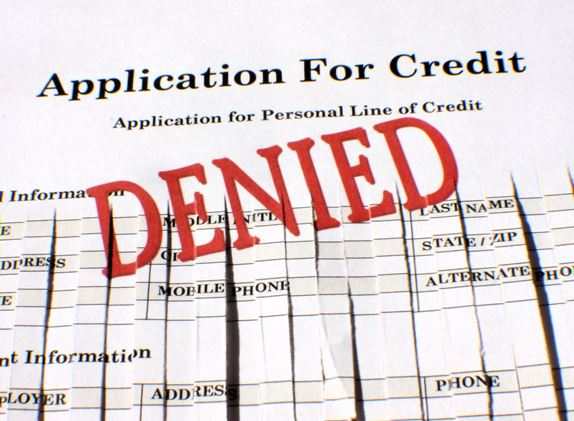Diana Chai
21st July 2015 - 6 min read
Many people who have been rejected in a loan or credit card application may assume it is due to some ominous ‘Bank Negara Blacklist’ (that doesn’t really exist by the way) or because the bank has been unfair in working out how creditworthy they are.
The truth is, before a bank decides to offer you credit (be it a card or a loan) where there is no collateral or guarantor the credit officers will assess how risky you may turn out to be as a customer. They want to know whether you’ll be able to pay your loan back.

Although the exact algorithm/calculation will differ from bank to bank the factors considered remain roughly the same. If you are wondering why your loan was not approved,or why you didn’t get that new credit card, the following 5 reasons may have played a part.
1. You Have a Sketchy Credit History
The first and most commonly known factor is, of course, your credit history. However, you may have assumed that there is a scary ‘black list’ somewhere in Bank Negara that has your name on it in bold and marked “Do Not Lend”. That is not true.
What Bank Negara does have is your credit history and that includes all the loans for which you have applied, been rejected or approved as well as the monthly repayments you have been making toward your debts.
This plays a role because a bank will be able to see just how good a paymaster you have been (or not been!). It may seem unfair; but some banks penalise you for being late with payment even if you haven’t missed any per se.
For this reason, it is super important to pay your instalments on time. Set up a standing instruction if you think it may help you be more diligent with payment.
Some people ask: what if I’ve never borrowed money before and have no credit history at all – will that work against me when I want a loan approved? Truth to tell, we don’t know. We can say that if you have a record of borrowing with an excellent payment history it will work in your favour (provided you don’t have any current loans).
2. Your Income is Not Stable or Too Low
You may be raking in tens of thousands and storing this in your bank but if you only get this payout say once every six months; it may raise some concern with the bank processing your application.
Many banks have turned down applicants on the basis that their incomes were too sporadic even if they were earning healthy amounts. This is usually the case with those who run their own businesses. However, some banks do not discriminate so it may be necessary to try a few before deciding to give up.
If you are in fixed employment, your income may still be in an issue if it is considered by the bank to be too low or if you earn on a commission basis. Banks do have minimum income thresholds but even if you meet these, you may be turned away if your income is exactly on the minimum threshold and other factors are clouding your application. There are specific loans for low income earners but if you earn a good commission, it’s best to provide all details and evidence of commission earnings to the bank.
Although, banks ask for 3 months salary details; commission earners or those self-employed could ideally provide 6 months of bank statements/commission slips to show they are credit worthy. Essentially, the more evidence you can provide, the better your chances.
3. You Have Too Many Payments and Loans
There are times when you could have a decent salary, good credit history but still be rejected for a loan. It could be because your commitment level is too high. Called a Debt Service Ratio, it is the calculation used to see if you can comfortably make your repayments monthly. The general ratio is 60% of your monthly salary. This means that your total amount of repayments per month cannot exceed 60% of your salary.
However, the bank is at liberty to adjust this ratio internally so even if you’ve calculated your repayments to be well within 60%; take note that the bank in question could set their calculations differently.

4. Your Job is Not in a ‘Preferred’ Industry
For lack of a better word, we use ‘preferred’ because it seems the closest way to describe this criteria. Many banks will have an internal list of industries/companies they deem to be ‘preferred’. If you work in these industries, the chances of you getting a loan is higher.
Although, we do not have access to what this list of industries/companies really look like for each bank; in our experience it is usually a case of a Sdn Bhd looking quite good but an Multinational Corporation (MNC) looking much, much better.
5. Your Bank Account Looks Sketchy
Beyond the unattractiveness of your credit history; the other history that may play a role in your application is your banking history. Along with your application, banks will ask you for your saving or current account statement wherein your salary is credited.
Though for the most part, this will be mainly to see that you really earn the salary you claim (and it is credited every month); some banks will also pay close attention to comings and goings of cash in your account. This is to see how attractive your cash flow is. Can you manage your money? Is your account in overdraft more often than not? Although, having little in the way of cash will not alone cause a bank to dismiss your application – it could look a lot more serious when coupled with other factors in this list.

You’ve Been Rejected, So What Now?
If your application has been rejected, you might be wondering what to do next. Banks won’t usually tell you why your application was not approved.
The best way to find out is to use the method of elimination. Go through the following steps.
1) Check out your own credit history. Even if you’re sure you’ve paid all your commitments well and on time – you might have unwittingly stood guarantor or something else might be up for dispute. If your history is clean as a whistle, it’s on to the next step.
2) Calculate your commitment level. Did you fall foul of the 60% rule or perhaps it’s not quite there but is very high. A consolidation loan may help reduce your monthly commitments.
3) If your credit history looks good; you aren’t saddled with too many loans but still did not have your loan approved, then it might be time to simply try another bank. The remaining criteria varies in importance from bank to bank so you just might find one willing to offer you a loan.
If you are looking for a personal loan, use our personal loan calculator to find the one best one for you. Need a new credit card? We have list of the best credit cards in our credit card comparison page too.









Comments (0)